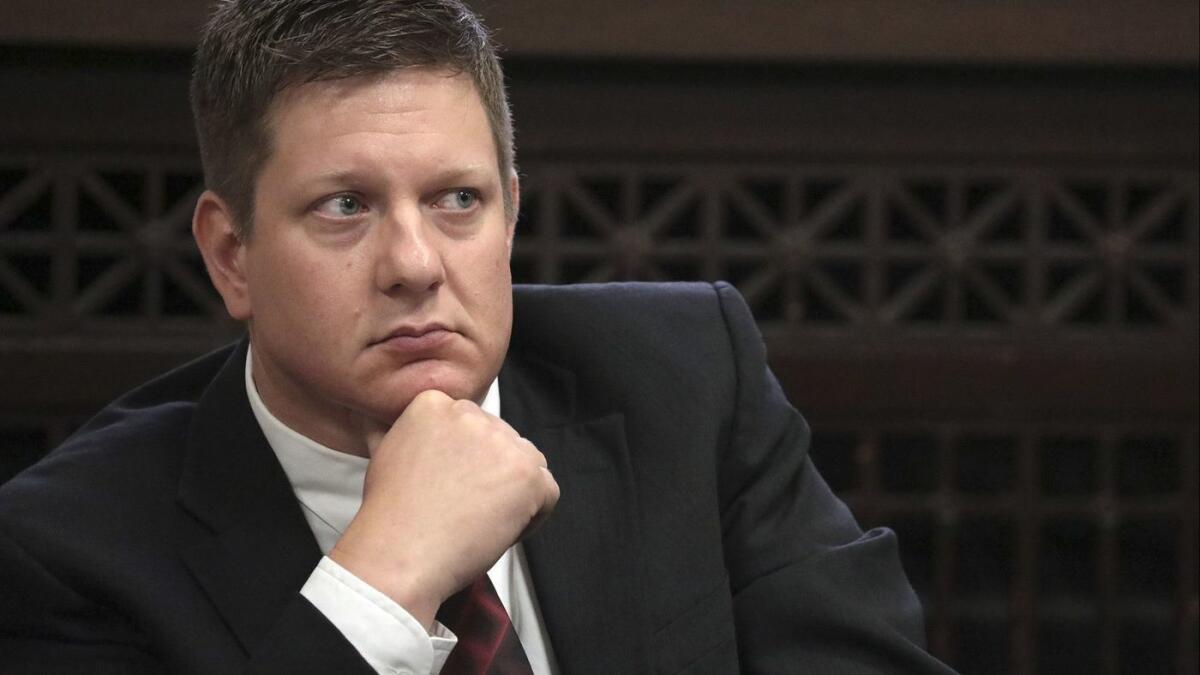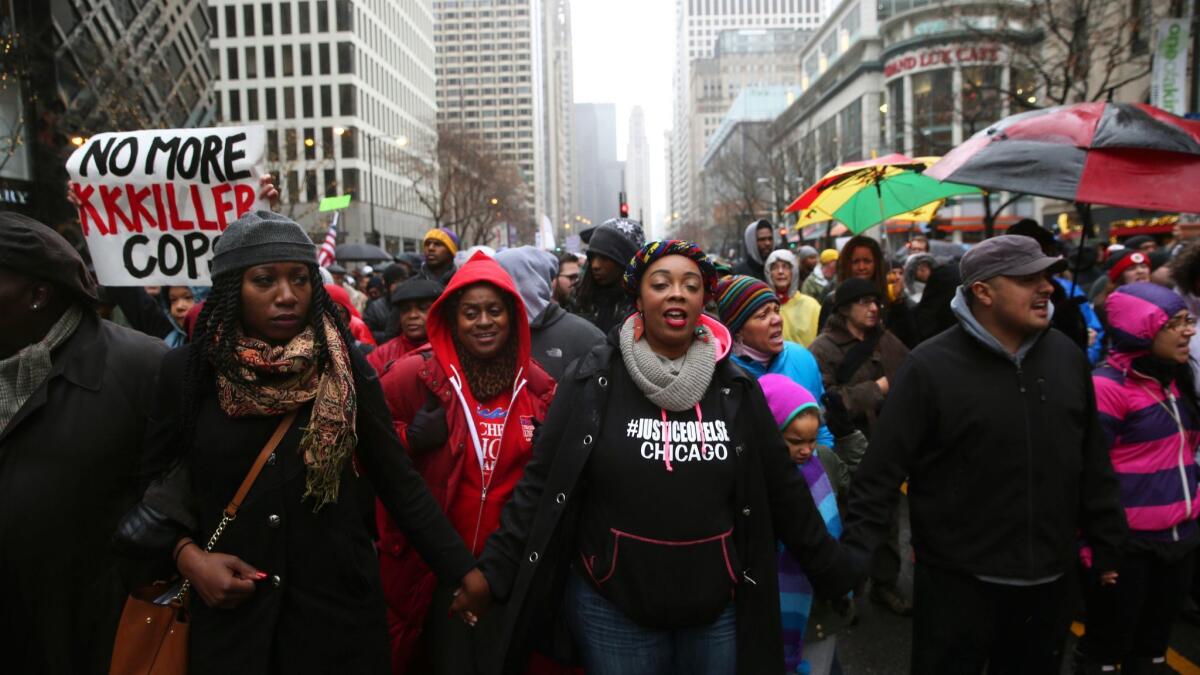As a city braces itself, jurors deliberate whether to convict a Chicago cop of murder

- Share via
While deadly shootings of African Americans by white police officers have become the target of protests across the nation, it’s rare for a cop to be charged with a crime. Rarer still is for an officer to be found guilty.
That could soon change in Chicago, a city that hasn’t convicted a police officer of murder in half a century.
On Thursday, jurors began deliberating on a case that has gripped the region since 2014, when Jason Van Dyke, a white officer, shot and killed a black teenager named Laquan McDonald. The case has become a symbol of the growing unrest over policing in the city, where a majority of police shootings over the years have been of black residents. Controversy over the teen’s death has led to resignations of top city and county officials, a federal investigation of the Police Department and reforms in policing.
“This is an incredibly historic trial that has fundamentally changed Chicago and the national conversation over police,” said Craig Futterman, a professor of law at the University of Chicago. “Everyone is watching.”
Van Dyke is charged with murder, aggravated battery and official misconduct in the October 2014 incident, in which he shot McDonald 16 times in less than 15 seconds. Officers had been following the teen since he was reported to be breaking into vehicles in a trucking yard. McDonald, who had a 3-inch folding knife with him, walked away when police arrived but was believed to have punctured a squad car’s tire. Officers, who kept their distance, followed him for blocks and radioed for assistance, asking that someone with a Taser come to the scene.
When Van Dyke arrived, he shot the teen.
Video from the police dashboard camera shows McDonald being shot while walking away from Van Dyke, then writhing on the ground as bullets continue to strike him. The city, which initially refused to release the video, was accused of a cover-up by civil rights groups, and released it only after the courts said it should be made public. The release coincided with Van Dyke being charged with murder.
Since the trial began nearly a month ago, the prosecution has painted Van Dyke as a trigger-happy officer who shot and killed someone who posed no threat to him or the other officers at the scene.
Van Dyke said he began shooting because he feared for his life and his fellow officers when McDonald did not follow instructions to drop his knife. Illinois law allows an officer to use deadly force when it’s “necessary to prevent death or great bodily harm to himself or such other person” or “necessary to prevent the arrest from being defeated by resistance or escape.”
Van Dyke said he continued shooting when McDonald waved a knife at him, even after being hit.
The grainy video, which lacks clear audio, does not show that.
“I just kept on looking at that knife and I shot at it,” Van Dyke testified this week. “I just wanted him to get rid of that knife.” He also said that the “video may not show it, but that wasn’t from my perspective” — that he was coming at it from “a completely different angle.”
Van Dyke, who is on unpaid leave from the department, is free on $1.5-million bail.
Controversy over the shooting has led to the removals of a county prosecutor and the police superintendent and has contributed to intense criticism of Mayor Rahm Emanuel, who announced last month that he wouldn’t run for reelection.
The teen’s death also sparked a Department of Justice investigation, which found that Chicago police routinely violated the civil rights of minorities, often treating them as “animals or subhuman.” Last year, one current officer and two former colleagues were charged with conspiring to cover up for Van Dyke after the shooting.
The trial itself has also been the subject of controversy because only one of the 12 jurors is African American. Census figures show 31% of Chicago residents are black.
“This case is a test of whether or not the continued police impunity in this city that reigns supreme will continue,” said Aislinn Pulley, a co-founder of the city’s Black Lives Matter chapter who criticized the jury makeup and has attended the trial. “We have been waiting a long time.”
The case is one of the few to remain unresolved from the so-called Ferguson era — when protests and policy debates erupted across the country after a white officer gunned down an unarmed black teen named Michael Brown in the St. Louis suburb in 2014.
In those cases, demonstrators have frequently pointed to racism, citing the prevalence of white police officers in black and minority communities and the lack of prosecutions when residents die at the hands of police. Judges and jurors cite state laws, in which police are given wide latitude to fire their weapons if they sense lethal danger — even if videos and evidence indicate there was none.
In Ferguson, a grand jury declined to indict the officer and federal investigators refused to file charges. In other high-profile police shooting cases that followed, officers either faced no charges or were acquitted.
That includes the 2016 shootings of Alton Sterling in Louisiana, Philando Castile in Minnesota and Terence Crutcher in Oklahoma.
There have been exceptions. In 2016, Portsmouth, Va., Officer Stephen Rankin was found guilty of voluntary manslaughter in the death of William Chapman, a teen he had shot the year before in a Walmart parking lot. Last year, Michael Slager, who fatally shot Walter Scott in North Charleston, S.C., in 2015, pleaded guilty to a federal civil rights violation charge. And in August, former Balch Springs, Texas, officer Roy Oliver was found guilty of murder for the 2017 shooting of teen Jordan Edwards.

In Chicago, many residents see the Van Dyke case as one that represents larger concerns over policing. A Chicago Tribune analysis in 2016 found that 80% of the police shootings between 2010 and 2015 were of black people. Nearly half were killed by white police officers.
Since McDonald’s death, city officials have launched a handful of policing changes. All officers now have Tasers and body cameras and there are tougher restrictions on when officers can shoot or use their Tasers. Last month, the city announced a proposal for court-enforced oversight of policing reforms stemming from flaws cited in the Justice Department investigation.
court-enforced oversight of a policing overhaul
Still, trust in the Chicago Police Department is low and protests have continued over new shootings. Activists have drawn up plans for demonstrations if they are unsatisfied with the outcome of Van Dyke’s trial, and police and hospitals are on alert. Organizers of this weekend’s Chicago Marathon say they are prepared for potential disruptions to the race, which begins and ends downtown.
“This city has been discriminating against black people for decades,” said veteran activist Frank Chapman, a black resident who has lived in the city on and off since 1959. “If we do not get a conviction of Van Dyke, there will be a lot of outrage. It will not be business as usual.”
Twitter: @jaweedkaleem
More to Read
Sign up for Essential California
The most important California stories and recommendations in your inbox every morning.
You may occasionally receive promotional content from the Los Angeles Times.














